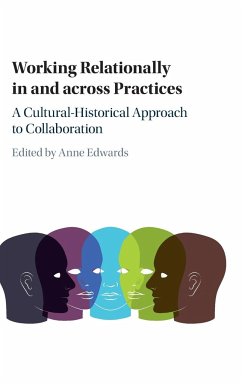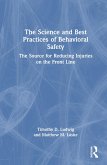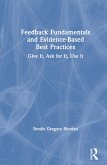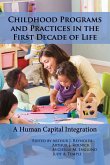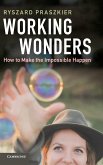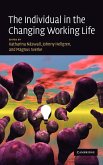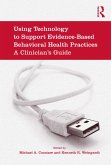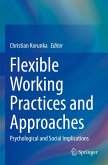Working Relationally In and Across Practices
Herausgeber: Edwards, Anne
Working Relationally In and Across Practices
Herausgeber: Edwards, Anne
- Gebundenes Buch
- Merkliste
- Auf die Merkliste
- Bewerten Bewerten
- Teilen
- Produkt teilen
- Produkterinnerung
- Produkterinnerung
This book shows ideas from cross-professional collaborators that offer resources for professional and research practices.
Andere Kunden interessierten sich auch für
![The Science and Best Practices of Behavioral Safety The Science and Best Practices of Behavioral Safety]() Timothy D LudwigThe Science and Best Practices of Behavioral Safety183,99 €
Timothy D LudwigThe Science and Best Practices of Behavioral Safety183,99 €![Feedback Fundamentals and Evidence-Based Best Practices Feedback Fundamentals and Evidence-Based Best Practices]() Brodie Gregory RiordanFeedback Fundamentals and Evidence-Based Best Practices181,99 €
Brodie Gregory RiordanFeedback Fundamentals and Evidence-Based Best Practices181,99 €![Childhood Programs and Practices in the First Decade of Life Childhood Programs and Practices in the First Decade of Life]() Childhood Programs and Practices in the First Decade of Life54,99 €
Childhood Programs and Practices in the First Decade of Life54,99 €![Working Wonders Working Wonders]() Ryszard PraszkierWorking Wonders83,99 €
Ryszard PraszkierWorking Wonders83,99 €![The Individual in the Changing Working Life The Individual in the Changing Working Life]() Katharina Naswall / Johnny Hellgren / Magnus Sverke (eds.)The Individual in the Changing Working Life150,99 €
Katharina Naswall / Johnny Hellgren / Magnus Sverke (eds.)The Individual in the Changing Working Life150,99 €![Using Technology to Support Evidence-Based Behavioral Health Practices Using Technology to Support Evidence-Based Behavioral Health Practices]() Using Technology to Support Evidence-Based Behavioral Health Practices86,99 €
Using Technology to Support Evidence-Based Behavioral Health Practices86,99 €![Flexible Working Practices and Approaches Flexible Working Practices and Approaches]() Flexible Working Practices and Approaches110,99 €
Flexible Working Practices and Approaches110,99 €-
-
-
This book shows ideas from cross-professional collaborators that offer resources for professional and research practices.
Hinweis: Dieser Artikel kann nur an eine deutsche Lieferadresse ausgeliefert werden.
Hinweis: Dieser Artikel kann nur an eine deutsche Lieferadresse ausgeliefert werden.
Produktdetails
- Produktdetails
- Verlag: Cambridge University Press
- Seitenzahl: 336
- Erscheinungstermin: 21. November 2016
- Englisch
- Abmessung: 235mm x 157mm x 24mm
- Gewicht: 697g
- ISBN-13: 9781107110373
- ISBN-10: 1107110378
- Artikelnr.: 47377337
- Herstellerkennzeichnung
- Produktsicherheitsverantwortliche/r
- Europaallee 1
- 36244 Bad Hersfeld
- gpsr@libri.de
- Verlag: Cambridge University Press
- Seitenzahl: 336
- Erscheinungstermin: 21. November 2016
- Englisch
- Abmessung: 235mm x 157mm x 24mm
- Gewicht: 697g
- ISBN-13: 9781107110373
- ISBN-10: 1107110378
- Artikelnr.: 47377337
- Herstellerkennzeichnung
- Produktsicherheitsverantwortliche/r
- Europaallee 1
- 36244 Bad Hersfeld
- gpsr@libri.de
1. Revealing relational work Anne Edwards; Part I. Working Relationally in
the Professions: 2. Expertise, learning, and agency in partnership
practices in services for families with young children Nick Hopwood; 3.
Learning and deploying relational agency in the negotiation of
inter-professional hierarchies in a UK hospital Joce Nuttall; 4. Relational
agency, double stimulation and the object of activity: an intervention
study in a primary school Annalisa Sannino and Yrjö Engeström; 5. An
analysis of the use of relational expertise, relational agency and common
knowledge among newly appointed principals in Chile's public schools Carmen
Montecinos, Verónica Leiva, Fabián Campos, Luis Ahumada and Sergio
Galdames; 6. Building and using common knowledge for developing
school-community links Prabhat Chandra Rai; 7. Building common knowledge:
negotiating new pedagogies in higher education in South Africa Shirley
Walters, Freda Daniels and Vernon Weitz; Part II. Working Relationally in
Networks: 8. Networked expertise, relational agency, and collective
creativity Kai Hakkarainen, Kaisa Hytönen, Jenna Vekkaila and Tuire
Palonen; 9. Relational agency and the development of tools in service
networks Laura Seppänen and Hanna Toiviainen; 10. Creating a system of
distributed expertise: the Oxford Education Deanery narrative Nigel
Fancourt; 11. Common knowledge: the missing link in hybrid value chains?
Marc Thompson, Catherine Dolan, Colin Mayer, Kate Roll and Ruth Yeoman; 12.
The relational agency framework as a tool for supporting the establishment,
maintenance and development of multidisciplinary networks of professionals
Marilyn Fleer, Iris Duhn and Linda J. Harrison; Part III. Working
Relationally in Research: 13. Research as relational agency: expert
ethnographers and the cultural force of technologies Cathrine Hasse; 14.
When daycare professionals' values for transition to school do not align
with the educational demands from society and school: a practice developing
research project for daycare professionals' support to children's
transition to school Mariane Hedegaard; 15. Relational approaches to
knowledge exchange in social science research Anne Edwards and Eleni
Stamou; 16. Designing the epistemic architecture for Galaxy Zoo: the case
study of relational expertise in citizen science Bipana Bantawa; Epilogue:
17. Using and refining the relational concepts Anne Edwards.
the Professions: 2. Expertise, learning, and agency in partnership
practices in services for families with young children Nick Hopwood; 3.
Learning and deploying relational agency in the negotiation of
inter-professional hierarchies in a UK hospital Joce Nuttall; 4. Relational
agency, double stimulation and the object of activity: an intervention
study in a primary school Annalisa Sannino and Yrjö Engeström; 5. An
analysis of the use of relational expertise, relational agency and common
knowledge among newly appointed principals in Chile's public schools Carmen
Montecinos, Verónica Leiva, Fabián Campos, Luis Ahumada and Sergio
Galdames; 6. Building and using common knowledge for developing
school-community links Prabhat Chandra Rai; 7. Building common knowledge:
negotiating new pedagogies in higher education in South Africa Shirley
Walters, Freda Daniels and Vernon Weitz; Part II. Working Relationally in
Networks: 8. Networked expertise, relational agency, and collective
creativity Kai Hakkarainen, Kaisa Hytönen, Jenna Vekkaila and Tuire
Palonen; 9. Relational agency and the development of tools in service
networks Laura Seppänen and Hanna Toiviainen; 10. Creating a system of
distributed expertise: the Oxford Education Deanery narrative Nigel
Fancourt; 11. Common knowledge: the missing link in hybrid value chains?
Marc Thompson, Catherine Dolan, Colin Mayer, Kate Roll and Ruth Yeoman; 12.
The relational agency framework as a tool for supporting the establishment,
maintenance and development of multidisciplinary networks of professionals
Marilyn Fleer, Iris Duhn and Linda J. Harrison; Part III. Working
Relationally in Research: 13. Research as relational agency: expert
ethnographers and the cultural force of technologies Cathrine Hasse; 14.
When daycare professionals' values for transition to school do not align
with the educational demands from society and school: a practice developing
research project for daycare professionals' support to children's
transition to school Mariane Hedegaard; 15. Relational approaches to
knowledge exchange in social science research Anne Edwards and Eleni
Stamou; 16. Designing the epistemic architecture for Galaxy Zoo: the case
study of relational expertise in citizen science Bipana Bantawa; Epilogue:
17. Using and refining the relational concepts Anne Edwards.
1. Revealing relational work Anne Edwards; Part I. Working Relationally in
the Professions: 2. Expertise, learning, and agency in partnership
practices in services for families with young children Nick Hopwood; 3.
Learning and deploying relational agency in the negotiation of
inter-professional hierarchies in a UK hospital Joce Nuttall; 4. Relational
agency, double stimulation and the object of activity: an intervention
study in a primary school Annalisa Sannino and Yrjö Engeström; 5. An
analysis of the use of relational expertise, relational agency and common
knowledge among newly appointed principals in Chile's public schools Carmen
Montecinos, Verónica Leiva, Fabián Campos, Luis Ahumada and Sergio
Galdames; 6. Building and using common knowledge for developing
school-community links Prabhat Chandra Rai; 7. Building common knowledge:
negotiating new pedagogies in higher education in South Africa Shirley
Walters, Freda Daniels and Vernon Weitz; Part II. Working Relationally in
Networks: 8. Networked expertise, relational agency, and collective
creativity Kai Hakkarainen, Kaisa Hytönen, Jenna Vekkaila and Tuire
Palonen; 9. Relational agency and the development of tools in service
networks Laura Seppänen and Hanna Toiviainen; 10. Creating a system of
distributed expertise: the Oxford Education Deanery narrative Nigel
Fancourt; 11. Common knowledge: the missing link in hybrid value chains?
Marc Thompson, Catherine Dolan, Colin Mayer, Kate Roll and Ruth Yeoman; 12.
The relational agency framework as a tool for supporting the establishment,
maintenance and development of multidisciplinary networks of professionals
Marilyn Fleer, Iris Duhn and Linda J. Harrison; Part III. Working
Relationally in Research: 13. Research as relational agency: expert
ethnographers and the cultural force of technologies Cathrine Hasse; 14.
When daycare professionals' values for transition to school do not align
with the educational demands from society and school: a practice developing
research project for daycare professionals' support to children's
transition to school Mariane Hedegaard; 15. Relational approaches to
knowledge exchange in social science research Anne Edwards and Eleni
Stamou; 16. Designing the epistemic architecture for Galaxy Zoo: the case
study of relational expertise in citizen science Bipana Bantawa; Epilogue:
17. Using and refining the relational concepts Anne Edwards.
the Professions: 2. Expertise, learning, and agency in partnership
practices in services for families with young children Nick Hopwood; 3.
Learning and deploying relational agency in the negotiation of
inter-professional hierarchies in a UK hospital Joce Nuttall; 4. Relational
agency, double stimulation and the object of activity: an intervention
study in a primary school Annalisa Sannino and Yrjö Engeström; 5. An
analysis of the use of relational expertise, relational agency and common
knowledge among newly appointed principals in Chile's public schools Carmen
Montecinos, Verónica Leiva, Fabián Campos, Luis Ahumada and Sergio
Galdames; 6. Building and using common knowledge for developing
school-community links Prabhat Chandra Rai; 7. Building common knowledge:
negotiating new pedagogies in higher education in South Africa Shirley
Walters, Freda Daniels and Vernon Weitz; Part II. Working Relationally in
Networks: 8. Networked expertise, relational agency, and collective
creativity Kai Hakkarainen, Kaisa Hytönen, Jenna Vekkaila and Tuire
Palonen; 9. Relational agency and the development of tools in service
networks Laura Seppänen and Hanna Toiviainen; 10. Creating a system of
distributed expertise: the Oxford Education Deanery narrative Nigel
Fancourt; 11. Common knowledge: the missing link in hybrid value chains?
Marc Thompson, Catherine Dolan, Colin Mayer, Kate Roll and Ruth Yeoman; 12.
The relational agency framework as a tool for supporting the establishment,
maintenance and development of multidisciplinary networks of professionals
Marilyn Fleer, Iris Duhn and Linda J. Harrison; Part III. Working
Relationally in Research: 13. Research as relational agency: expert
ethnographers and the cultural force of technologies Cathrine Hasse; 14.
When daycare professionals' values for transition to school do not align
with the educational demands from society and school: a practice developing
research project for daycare professionals' support to children's
transition to school Mariane Hedegaard; 15. Relational approaches to
knowledge exchange in social science research Anne Edwards and Eleni
Stamou; 16. Designing the epistemic architecture for Galaxy Zoo: the case
study of relational expertise in citizen science Bipana Bantawa; Epilogue:
17. Using and refining the relational concepts Anne Edwards.

